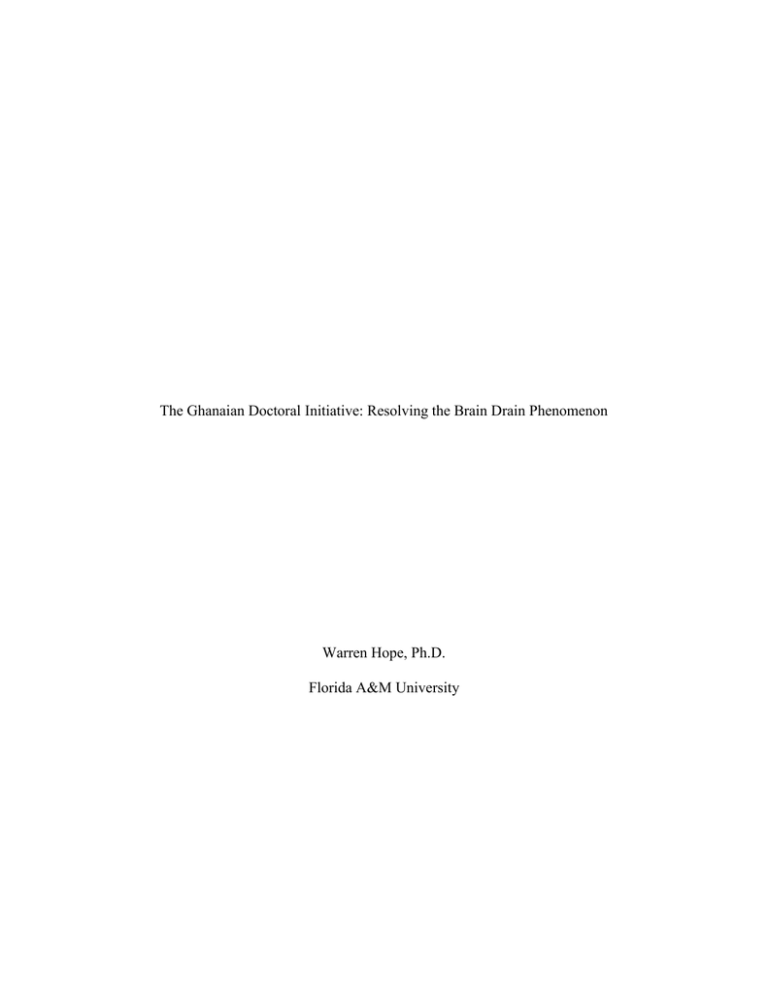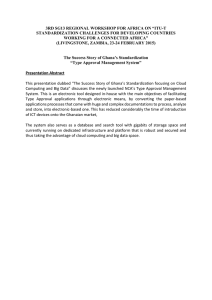The Ghanaian Doctoral Initiative: Resolving the Brain Drain Phenomenon
advertisement

The Ghanaian Doctoral Initiative: Resolving the Brain Drain Phenomenon Warren Hope, Ph.D. Florida A&M University Abstract Many African countries experience the effects of the Brain Drain phenomenon. There are at least two dimensions to consider in a discussion of brain drain, academic and professional. No matter the dimension, brain drain constitutes a major problem for African countries. Brain drain is characterized by the exit of scholars and other skilled professionals from an African nation to live and work in a developed country. The phenomenon is particularly acute with regard to university scholars. African universities are frontline institutions for national development. Brain drain’s effect on African countries is negatively manifold and continuation jeopardizes national and continental development. This paper presents a successful collaborative, The Ghanaian Doctoral Initiative (GDI), between Florida A&M University and the University of Cape Coast, Ghana, West Africa. The GDI was designed and implemented as an intervention to alleviate the academic brain drain phenomenon in higher education in Ghana. The Ghanaian Doctoral Initiative: Resolving the Brain Drain Phenomenon Background While the Brain Drain phenomenon affects various sectors of society in African nations, The Ghanaian Doctoral Initiative (GDI) was designed and implemented to address the impact of the problem in the arena of higher education. Today, in Africa higher education is widely recognized as the avenue to upward mobility and economic prosperity, a key to scientific and technological advancement, and an intervention for poverty. Demand for higher education in Ghana has soared with the increase in secondary school leavers (Aggor, Kinyanjui, Pecku, & Yerbury, 1992). Overall though, Ghana’s universities admit only about 25-30% of qualified applicants (Harsch, 2000). This state of affairs can be attributed to the phenomenon known as brain drain as African universities lack sufficient numbers of qualified lecturers and researchers with the terminal degree. Additionally, African universities do not produce enough qualified lecturers and researchers to populate its higher education institutions. Beyond this circumstance is the fact, that many of Africa’s most capable seek education and employment outside the home country. Brain drain results when African countries sponsor students abroad to obtain an advanced degree, however, that individual does not return to the home country upon degree attainment. The phenomenon is also related to academics and professionals who leave the home country seeking opportunity to employ their skills abroad for higher levels of remuneration, and to escape poverty. In all instances the home country derive no significant benefits from the investment in intellectual capital or the flight of the academics and professionals. The GDI initiative addresses the brain drain phenomenon at the university level, specifically academics and the Ph. D. degree. 1 Impact of Brain Drain Phenomenon There is a continuous refrain of negative news for Africa related to brain drain. Wachira Kigotho in the article Report Calls for New Effort to Halt Academic Brain Drain From Africa, which appeared in the Chronicle of Higher Education in 2001, asserted that the emigration of academics from African Universities constituted one of the most significant obstacles to the continents development. Kigotho also referred to an article by writer, Chris Buckley who stated that Africa had lost approximately one-third of its skilled professionals over the past several decades. Mark Pires, Ronald Kassimir, and Mesky Brhane in their study Investing in Return: Rates of Return of African Ph. D.’s Trained in North America provided statistical evidence of the phenomenon demonstrating that of the 5,537 sub-Saharan Africans seeking the Ph. D., degree in North America, of that total only 57% of the graduates returned to their home country. The brain drain litany of negatives does not stop with this sequence of facts as the impact of brain drain reverberates throughout the literature on this subject. Renown scholar, Philip Emeagwali in a keynote address at the Pan African Conference on Brain Drain in Elsah, Illinois in 2003 presented some startling statistics about the brain drain phenomenon. Emeagwali’s keynote address at the Pan African Conference on Brain Drain dramatized the startling statistics on Africa’s brain drain phenomenon. He noted that the number of trained doctors in Zambia had at one time reached 1600, however, over the past few years; brain drained had reduced the number of practicing doctors to approximately 400. The same negative news story can be used as a template to describe the attrition of academics and professionals of other African countries to the developed world. Given the existing colonial legacy and the prevailing levels of poverty and health care in Africa, the leeching away of these vital capacities continues to undermine national 2 development and erodes the capability of the interrelated systems that require the competencies and skills of professionals to function effectively. Kyereme (1998) drew attention to this fundamental issue exclaiming that “before we can seriously attack the main tormenting problems, we need competent, alert, and confident human resources from our educational institutions—from kindergarten to the university. Our educated people, as decision makers, problem solvers, and agents of change must know these problems well—as well as the methods for solving them” (p. 4). John Kiwanuka Ssemakula a public health doctor from Uganda and editor of Medilinks reported yet another series of disturbing realities related to brain drain. He reported that (a) Africa lost 60, 000 professionals between 1985 and 1990, (b) fifty percent of Kenya’s graduates emigrate to South Africa, (c) fifty percent of Ghana’s nurses and 90% of its doctors go abroad, and (d) twenty-one thousand Nigerian doctors are currently in the United States. Dr. Mohan Kaul too, echoed very much the same catastrophic news created by brain drain. In an article entitled, “Reversing Africa’s Brain Drain: The AfricaRecruit Initiative and the Challenge to Governments, The Diaspora and the Private Sectors, it was reported that 40% of all African professionals left the continent following the space of time after decolonization. Building the infrastructure and capacity of Africa in the 21st century requires the talent of its human resource. This being the inescapable case, a question to pose is how will the nations of Africa be able to meet the challenges and goals of national development when its scholars and professionals have left and are contributing to the development and capacity building of other nations? It is without question that a significant contribution to Africa’s development and capacity building is derived from the ranks of the professional classes, lawyers, doctors, engineers, and other terminal degreed individuals. At the present time, the situation in Africa 3 finds that talented individuals leave various countries seeking the terminal degree in European and North American universities, however, a significant number of those who receive the Ph. D. fail to return home. This represents a loss of intellectual capital in two ways. First, the support provided by the home country does not result in a return investment and second, the home country does not get the longitudinal intellectual contribution towards national development represented in these individuals when they fail to return. The loss of skill from African nations is not a recent phenomenon. Indeed, a case can be made for a previous even larger brain drain that occurred during the centuries of the Atlantic Slave Trade. Today, amid a set of other circumstances (which by is intertwined with the first brain drain phenomenon), Africa continues to lose its intellectual capacity to other countries, which results in a profound negative impact throughout the continent. That impact reverberates through all sectors of society, particularly health and education. Urban and rural development, too, are stymied in the thrusts toward national development. Hardly ever, however, do phenomena occur minus underlying causes. Brain drain is no exception. What are the precipitant causes of brain drain? While it is one matter to criticize Africans for searching for ways out and neglecting to return and contribute to national development, it is also important to respect the reasons given by African scholars and professionals for staying abroad. Significant among the reasons contributing to the nonreturn of academics is the remuneration possible in the host country. Another contributing factor is related to the inadequate facilities and resources available in many African countries to facilitate the research and scholarship professionals want to engage in. A third reason for nonreturn is related to political instability that often translates into persecution of particular groups in some African countries. Finally, given a mass return of the exodusters to the African continent, African 4 governments need to provide work opportunities, salaries, and benefits commensurate with that which individuals will leave in order to return to the home country. In the absence of the opportunity for a competitive lifestyle afforded in a developed country, the brain drain phenomenon will undoubtedly persist into a long term future. The Ghanaian Doctoral Initiative African countries’ pace toward national development will depend greatly on their flagship universities’ adjustments to brain drain and designed interventions in the face of this phenomenon. In today’s global higher education environment, linkages, partnerships, and collaboratives are appropriate interventions that African universities can capitalize on in order to alleviate the challenges engendered by Brain Drain. While brain drain creates difficulties in various sectors of society, The Ghanaian Doctoral Initiative (GDI) is a collaborative designed to address the impact of brain drain in Ghana at the university level. In September 2000, the United States Agency for International Development (USAID) awarded a $700,000.00 contract to Florida A&M University (FAMU) to offer a Ph. D. degree program in Educational Leadership in partnership with the University of Cape Coast (UCC) in Ghana, West Africa. The contract was a one-year pilot that emphasized the development of a distance education teaching and learning model. The project funded the establishment of a technology infrastructure in the form of distance education classrooms in the College of Education at FAMU and in the Faculty of Education at UCC, 12 hours of out-of-state tuition for 10 Ghanaians selected to participate in the project, and funds to purchase support resources, computers, printers, software, office supplies, copy machine, and other materials to implement the initiative. 5 Florida A&M University and the University of Cape Coast entered into a Memorandum of Agreement (MOA) to collaborate in order to enhance institutional development, strengthen cultural, social, and scientific ties, and to offer a Ph. D. degree program in Educational Leadership via distance education in January 2001. Present at the MOA signing was a delegation from FAMU including the Dean of the College of Education, from UCC the Vice Chancellor and Pro Vice Chancellor, and a representative from USAID, Accra. The GDI was inaugurated with considerable enthusiasm for its potential on both sides of the Atlantic. The GDI supported the institutional mission of FAMU given its acknowledgement of the inter-relatedness of the global community and desire to engage in activities that internationalized the University’s programs. Additionally, the Educational Leadership Program Mission statement embodies the commitment to “provide services which bring knowledge to focus on social problems and to support research relevant to the solution of human problems that affect society.” For FAMU there were additional benefits beyond altruism. Those benefits were the internationalization of FAMU’s Educational Leadership program, Educational Leadership faculty members acquisition of international teaching experience, faculty members contribution of their professional expertise in support of intellectual and institutional capacity building at a university in a developing country, and the fact that the GDI afforded FAMU opportunity to development a cost-effective distance education program model that can be replicated by other U. S. universities. The opportunity for cooperation and to design an intervention to address one of the most pressing problems on the African continent excited the imaginations of scholars at Florida A&M University and at the University of Cape Coast in Ghana. Moreover, the GDI had promise for upgrading the technological capacity for student learning at FAMU and UCC. Then too, the GDI 6 partly fulfills the dreams of the early 20th century Pan Africanists, W. E. B. DuBois, Marcus Garvey, Henry Sylvester Williams (West Indies), Kwame Nkrumah (Ghana), Harry Thuku (Kenya), C. L. R. James (Caribbean), George Padmore (Trinidad), to name a few, who visualized a time when Africans on the continent and Africans in the diaspora would engage in cooperative ventures that would result in continental uplift. The GDI was initiated with several fundamental objectives. Primary among those objectives are: 1. Arrest the “Brain Drain” that African countries (especially Ghana) are experiencing. 2. Increase the number of terminal degree (Ph. D.) faculty lecturers and researchers at the University level. 3. Develop a cadre of researchers who will conduct research within Ghana and disseminate research findings to policy makers who can implement findings in educational programs for national development. 4. Prepare individuals with knowledge, skills, and dispositions necessary for them to assume leadership roles in the primary, secondary, and technical schools, at the university level, and in other national agencies and organizations. The partnership between FAMU and UCC intended to alleviate the “Brain Drain” phenomenon in Ghana by offering a Ph. D. degree in Educational Leadership on African soil. Offering an advanced degree on African soil eliminates the need for African students to leave their home countries. The GDI was developed as an initiative to circumvent the outflow of professional expertise from Ghana and an effort to engage in intellectual capacity building. The Initiative is premised on the constructs of providing Ghanaians with access to quality education leading to a terminal degree without recipients leaving the home country. Many donor 7 organizations and universities offer fellowships and scholarships at various universities, however, to take advantage of theses requires Africans to travel abroad. The GDI deviates from many similar schemes designed to provide educational opportunities to Africans. With the GDI, when students complete degree requirements they remain in the country and can immediately apply their talents through employment at the University, and by engaging in problem solving and research related to various problems within the country. The Ph. D. Program in Educational Leadership. The Ph. D. program in Educational Leadership is based on a cohort model. The cohort model is characterized by (a) the admission and retention of a fixed number of students, (b) a specific time of entry for students and a proposed time of exit, and (c) a common core curriculum that extends over a period of two years. The program in Educational Leadership requires the satisfactory completion of 54 semester hours of course work, which is taken over a period of two years, (contiguous semesters), and a minimum of 15 dissertation credit hours. The GDI is a fulltime program that requires students to enroll for three courses (nine hours) each semester for two years. Upon satisfactory completion of course work, (students must maintain a 3.0 GPA on a 4.0 scale) students must also pass a written comprehensive examination in order to be admitted to Ph. D. candidacy. From its inception, the GDI was conceived as a three-year project, that is, students would have three years of support in order to fulfill the requirements for the Ph. D. requirements. The first nine hours of the program were delivered on-site at UCC in June 2001. Soon it was recognized that the one-year pilot timeframe was insufficient to manifest the full intent of the initiative and to realize its ambitious objectives. After initial implementation of the GDI, USAID granted contract extensions through September 2004, in order to support the program and to provide time to realize stated objectives. Extensions of time enabled both universities to 8 begin the process of identifying space and procuring the technology components required to engage in distance education. Both universities had to overcome infrastructure inadequacies and acquire corresponding technology components in order to position themselves for delivery of distance education. The process of establishing distance education classrooms at FAMU and UCC campuses was time consuming and tedious (in fact, the time to accomplish the related tasks was underestimated). First, appropriate distance education equipment had to be identified and ordered, and in the case of UCC shipped from an approved vendor. While components for the distance classrooms were being identified and procured, the delivery of courses continued on site at UCC. FAMU faculty members traveled to Ghana and met with UCC lecturers, planned and delivered content for courses. FAMU faculty members and UCC lecturers worked together to create a culturally sensitive and relative curriculum for the Ph. D. program. Students continued to receive instruction and were steadily working toward the Ph. D. degree while the processes leading to the distance education delivery model were proceeding. Team Work and Collegiality From the outset FAMU and UCC administrators, faculty members and UCC lecturers partnered for the success of the GDI. The working relationship began to be established when review of documents, and interviews for the first cohort of Ghanaian students were conducted. Collegial relationships were built during the selection and interview phase of the GDI and continued with the delivery of courses. FAMU faculty members and UCC lecturers brought specific knowledge and expertise to the GDI. As outsiders, FAMU faculty members realized the importance of UCC lecturers in maintaining cultural relevance and resolution capabilities in case of misinterpretations. 9 An important component of the success of the GDI has been the establishment of positive working relationships among FAMU faculty members and UCC lecturers. Cognizant of the fact that the imposition of ideas on others and assuming an all-knowing role in another culture would not engender positive relations, FAMU faculty members realized cultural differences and sought to learn about Ghanaian history and culture prior to implementing the GDI. FAMU faculty members participated in several workshops presented by Ghanaians and other Africans from the continent in order to learn more about Africa, Ghana and its people. In addition, upon arrival in Ghana, FAMU faculty members requested and received orientation to the history and culture of Ghana prior to teaching courses. To effectively deliver a Ph. D. degree program FAMU faculty members and UCC lecturers had to be willing to learn from each other, reach consensus on numerous issues, recognize and respect the experiences and expertise of each other. Prior to the delivery of courses (while waiting for the distance classrooms to become functional) FAMU faculty and UCC lecturers spent hours mapping out teaching strategies and deciding upon course content and determining which scholar possessed the experience and expertise to deliver specific content for courses. These sessions, which preceded the delivery of content for courses were deemed to be of great value as professors developed collegiality and came to know each other through this interaction. It is important to note that FAMU and UCC entered the GDI as fully committed partners, not as senior or junior partners. Present GDI Outcomes In the GDI, the image for preparing educational leaders has come to be known as Holistic Leadership. Without a doubt, leadership in and of itself is multidimensional. In keeping with this construct of leadership, the Holistic Leader is multifaceted, change and results oriented. The 10 Holistic Leader is forward-looking and proactive, capable of engaging in diagnosis and prescription, and interested in influencing behavior, structures, procedures and outcomes within an organization. Holistic leadership embodies several concepts, which arise from the expectations of what is needed of educational leaders in Ghana. Presently, there are ten characteristics embodied in Holistic Leadership. These characteristics were identified from the Ghanaian life context and the knowledge of what leaders need to know and be able to do within Ghanaian culture and educational context. Because of the evolving nature of Ghanaian culture, society and the educational system, it is anticipated that other characteristics will emerge for inclusion in this leadership paradigm. It was through the Holistic Leadership collaborative characteristic that the characteristics were developed. Students along with UCC lecturers and FAMU faculty members conceptualized the essence of each characteristic. Each characteristic embodies a working construct as well as the operational elements of what an educational leader should know and be able to do in the Ghanaian educational leadership context. The characteristics or elements of Holistic Leadership are: (a) vision, (b) diplomacy, (c) functionality, (d) entrepreneurship, (e) change agentry, (f) mentor, (g) innovation, (h) collaboration, (I) inspiration, and (j) service provider. These characteristics embrace competencies that are responsive to the education enterprise’s goals, requirements for effective communication with stakeholders, development of effective educational policies, acquisition of resources for facilities and students, and improvement of educational processes that impact student outcomes. Each element relates to the educational leader’s work within the context of Ghana’s educational system. In other words, the Ghanaian context requires leaders to demonstrate competence in each of these areas in order to be an effective educational leader and to achieve organizational goals. This new image for preparing educational leaders then, involves 11 imparting information and providing experiences that will develop the core elements essential for the Holistic Leader. The Holistic Leader is aware of the various leadership theories because of extensive immersion in the literature and implementation of principles as a practitioner and through field experiences within educational organizations. To that extent, the present cadre of students is exposed to the knowledge base of leadership literature and actual leadership experiences. The Holistic Leader is required to understand the four foundations of an organization, how those foundations are interrelated and impact each other. A prominent skill of the Holistic Leadership is the ability to diagnose organizational dysfunctions and recommend remedies to alleviate or eliminate those dysfunctions. In that regard, the Holistic Leader must fully comprehends the totality of organizational workings in order to know what to change, when to change it, and with what to make the change. Holistic Leadership then, embodies the thought of preparing individuals with the broadest base of leadership competencies, skills, and experiences, which in turn, afford individuals opportunity to use an extensive knowledge base and experiential background to meet the challenges of designing effective and efficient educational delivery services to improve a developing nation’s educational system. Ghanaian students in the GDI received financial support from USAID and FAMU in order to complete the Ph. D. in Educational Leadership. Students had three years of tuition, books, and other fees support. At the present time eight students in the Ghanaian Doctoral Initiative, comprising Cohort 2001, have received the Doctor of Philosophy degree in Educational Leadership from Florida A&M University. Those students and their dissertations are: Yaw Afari Ankomah, A Comparison of the Supervisory Practices of Heads of Public and Private Basic 12 Schools in the Brong Ahafo Region of Ghana, Rosemary S. Bosu, An Assessment of the Availability and Utilization of Technology in Ghanaian Public Universities, Cynthia S. Kpeglo, Assessing Institutional Responses to Tertiary Education Expansion in Ghana, Charles B. Duedu, Attitudes of Junior Secondary School Students Toward, Christina S. Boateng, An Assessment of Leader Effectiveness in Ghana’s Polytechnic Institutions, Martin Y. Zame, Effective Leadership Competencies for Head Teachers in Ghana’s Basic Schools, Linda D. Forde, The Impact of Sexual Abuse on Ghanaian School Girls: Implications for School Counselors, Teachers, and Parents, and Fiifi Mensah, An Investigation of the Factors that Influence Gender Differences and Impact Junior Secondary Students Decision to Study Science in Senior Secondary School. Conclusion At this point, the success of the GDI can be recognized in the eight new Ph. D.’s in Educational Leadership (accomplished in three year time span) who maintain residence in Ghana are making a contribution in the educational sector. Seven of the students are employed as lecturers at the University of Cape Coast and are actively involved in teaching and research. The eighth student is a Director with the Management Development Productivity Institute (MDPI) in Accra. While the GDI can be deemed successful, there remains some unfinished business to be resolved before pronouncement of total success. The centerpiece of the GDI is its ability to demonstrate functionality as a distance education model via technology. An operational technology model will be demonstrated by the synchronous delivery of courses emanating from FAMU to UCC and vice versa. Again, operationalizing and implementing the technology component of the initiative has proven to be the most daunting and reoccurring problem for the GDI. All other difficulties encountered have been resolved in a relatively short span of time. The 13 target date for connectivity between the two Universities has been a moving target, having been set on numerous occasions only to have one problem after another to arise and frustrate. Originally targeted for operationalization in August 2004, the date for connectivity moved to October 2004, then to February 2005, and to April 2005. There is according to the distance education technical specialist one final piece of the technology component that must be in place before communication via distance education at FAMU and UCC can take place. FAMU and UCC personnel are hoping to resolve this matter in the next few weeks. The GDI will be complete success when FAMU and UCC link via Internet Protocol and deliver the first course via the distance education equipment located at the universities. The Ph. D. in Educational Leadership prepares individuals to assume leadership roles in primary and secondary schools, colleges and universities, governmental and non-governmental organizations and public and private agencies. It is to be recognized that the GDI is but one small effort in the struggle to stem the tide of brain drain in Africa. That being said, the GDI seeks to carve out a small role in the many efforts toward overcoming the difficulties posed by brain drain. Finally, 10 students comprised the initial Ghanaian cohort for the Ph. D. in Educational Leadership. In the fall semester 2004, an additional seven Ghanaians were admitted to the Ph. D. program in Educational Leadership under the GDI umbrella. Those students are now in the second semester of course work. 14 References Harsch, E. (2000). Ghana grapples with university fees. Africa Recovery, [on-line], 14(2), Available: http://www.un.org/ecosocdev/geninfo/afrec/vol14no2/ghana.htm Mutume, Gumisai.(2003). Reversing Africa’s brain drain. Africa Recovery, [on-line], 17(2), Available: http://www.un.org/ecosocdev/geninfo/afrec/vol17no2/172brain.htm Kigotho, Wachira. (2001). Report Calls for New Efforts to Halt Academic Brain Drain from Africa. Chronicle of Higher Education. (October 2001). Pires, Mark, Ronald Kassimir and Mesky Brhane. (1999). Investing in Return: Rates of Return of African Ph. D.’s Trained in North America. New York: Social Science Research Council. Teferra, Damtew. (1997). Brain Drain of African Scholars and the Role of Studying in the United States. Center for International Higher Education: Boston College. Ssemakula, John K. (2002). Brain drain. Medilinks [on-line], Available: http://medilinkz.org/features/articles/braindrain.htm Kyereme, K. S. (1998). Ghana’s development problems: Some reflections and solutions. Legon, Ghana. Kumasi Catholic Press. Wadda, Rohey. Brain Drain and Capacity Building in Africa: The Gambian Experience. Paper presented at the Joint ECA/IOM/IDRC Regional Conference in Addis Abba, Ethiopia, February 2000. Aggor, R. A., Kinyanjui, P. E., Pecku, N. K., & Yerbury, J. C. (1992). Survey on distance education in Ghana. Government of Ghana. 15




